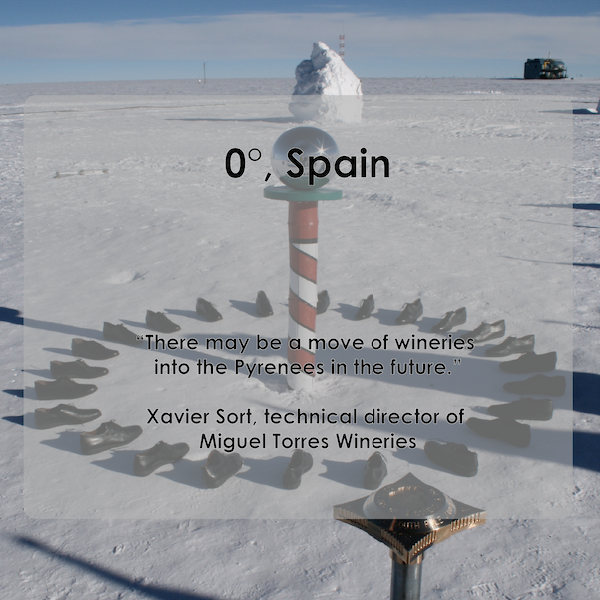
Home » 2007 » Longitudinal Installation » 24 Global Voices » 0°, Spain

“There may be a move of wineries into the Pyrenees in the future.”
— Xavier Sort, technical director of Miguel Torres Wineries
Xavier Sort was born in Terrassa in 1969, a city located in the province of Barcelona, Spain. Now serving as the current head of agricultural production at Familia Torres, or Miguel Torres Family Winery, a small 29-hectare winery producing select Cabernet Sauvignon, Sort represents half a century of a winegrowing tradition for one family and thousands of years of culture and history for a nation. His mission: to ensure grapes of the highest quality while seeking a harmonious balance between the plants and their environment, taking care of the land and respecting ecosystems.
Wineries around the world depend on these harmonious relationships between multiple factors including weather, water, soil, and sun to produce efficient, profitable, and high-quality yields. Although wine is classified as a luxury item, not essential to human survival, all agricultural activity is dependent upon these same climate systems. The smallest shifts both short- and long-term in climate and weather patterns can affect entire industries and economies and the foundations of multiple cultures. When Xavier Sort reported to Bloomberg in 2006 about the move of wineries into the Pyrenees, he mentioned Familia Torres’ move to purchase fields in the peaks of northeastern Spain. Another vintner at Castell d’Encus, Raul Bobet also purchased land area 3,281 feet high in the Pyrenees for his label. While a few took initiative over a decade ago, climate systems continue to change and much of the agriculture industry is feeling the impacts today.
In 2018, Europe experienced one of three warmest years together with 2014 and 2015, around +1.2 degrees Celsius relative to 1981 through 2010. Rainfall in southern Europe has dropped by up to 99 mm/decade. If global temperatures were to increase by two degrees Celsius, rising water deficits in Spain will push up demand for water in the agricultural industry between four and 18 percent by 2100, as well as for Cyprus, Greece, and Italy. Today, at least 22 million EU agriculture workers are directly exposed to climate extremes and 44 million food-related jobs will also feel the impacts.